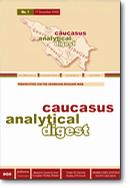No. 81: Religious Minorities

Author(s): Bruno De Cordier, Allan Kaval, Inga Popovaite
Editor(s): Bruno De Cordier (Special Editor), Tamara Brunner, Lili Di Puppo, Iris Kempe, Natia Mestvirishvili, Matthias Neumann, Robert Orttung, Jeronim Perović, Heiko Pleines
Series: Caucasus Analytical Digest (CAD)
Issue: 81
Publisher(s): Center for Security Studies (CSS), ETH Zurich; Research Centre for East European Studies, University of Bremen; Institute for European, Russian and Eurasian Studies, George Washington University, Caucasus Research Resource Centers, ASCN
Publication Year: 2016
